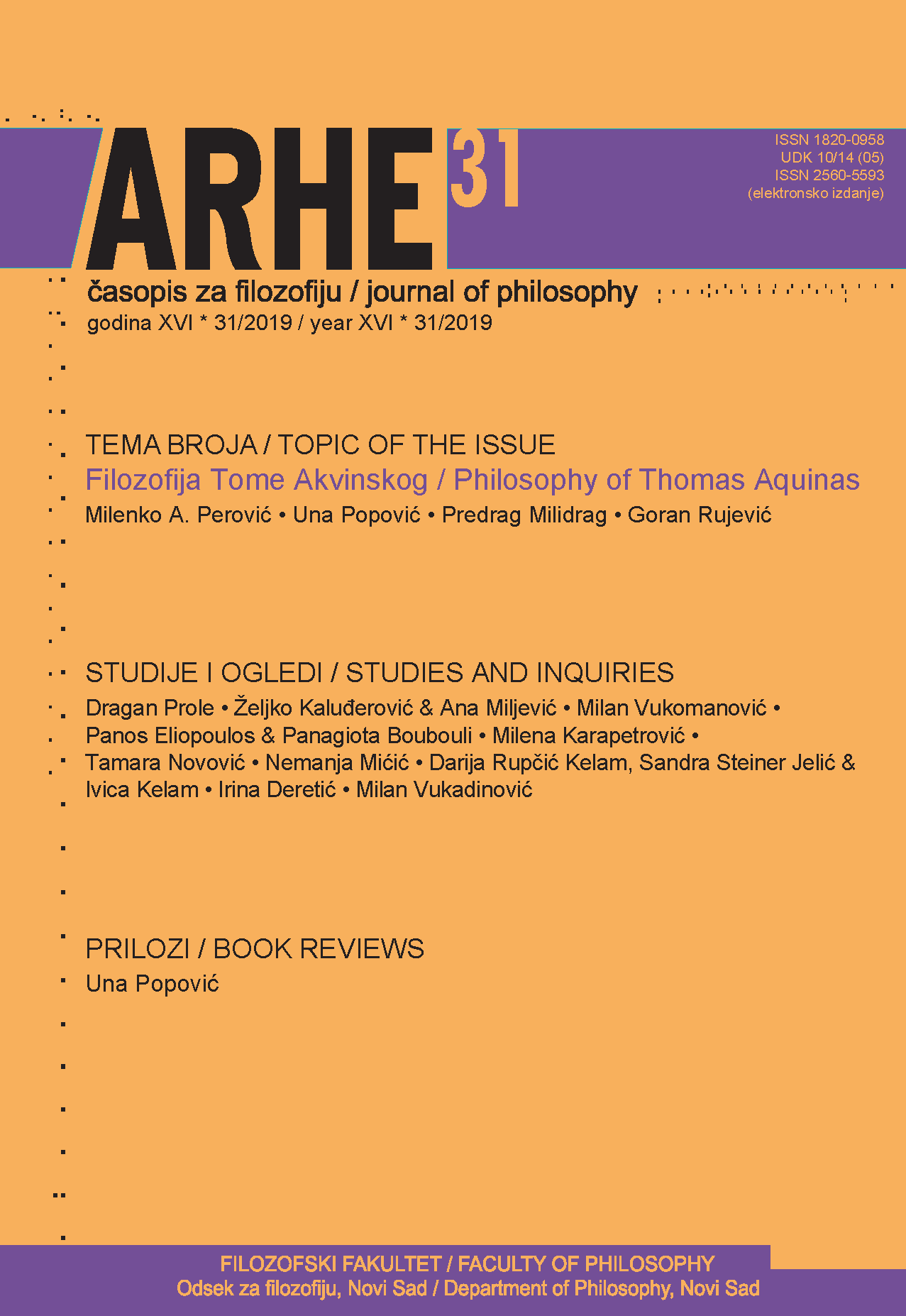CHEERFUL OR JOYFUL SCIENCE? ON TROUBADOUR SPIRIT OF PHILOSOPHY
Main Article Content
Abstract
Nietzsche’s book Fröhliche Wissenschaft (1882) was translated into Serbian language in 1984. by Milan Tabaković as Cheerful Science. Perhaps surprisingly, that solution has been widely accepted for decades, hardly any counter argument or different translation subsequent. Instead proposed adjective cheerful, it seems far more adequate and precise to say that for Nietzsche some sort of „science“ is joyful. This article deals with conceptual distinction between cheerfulness and joyfulness, as well as with some conceptual designs we came across in Winkelman’s aesthetics and in Schiller’s poetry. The author is eager to provide the interpretation of the provancal troubadours expression gay saber. Finally, we will try to uncover the possibilities of Nietzsche’s philosophy to assimilate the spirit of troubadours poetry.
Article Details
References
Astor, Dorian (2014) Nietzsche. La détresse du présent, Gallimard, Paris.
Grimm, Jacob/Grimm,Wilhelm (1984) Deutsches Wörterbuch Band 4/Abt. 1., DTV, München.
Haar, Michel (1993) Nietzsche et la métaphysique, Gallimard, Paris.
Hegel, Georg Wilhelm Friedrich (1835) Vorlesungen über die Ästhetik I, Duncker und Humblot, Berlin 1835, Hg. H. G. Hotho.
Hegel, Georg Wilhelm Fridrih (1870) Estetika I, Kultura, Beograd, prev. N. Popović.
Kay, Sarah (1990) Subjectivity in Troubadour Poetry, Cambridge University Press, Cambridge [et al.] 1990.
Mancini, Mario (2009) Die Fröhliche Wissenschaft der Trobadors, Königshausen & Neumann, Würzburg, üb. L. Schröder.
Miller, Elaine (2006) „Nietzsche on Individuation and Purposiveness in Nature“, A companion to Nietzsche, Blackwell Publishing, Malden [et al.], ed. K. A. Pearson.
Nietzsche, Friedrich (1979) „Versuch einer Selbstkritik“, u: Die Geburt der Tragödie oder Griechentum und Pessimismus, u: Werke I, Ullstein, Frankfurt am M./Berlin/Wien 1979, Hg. K. Schlechta.
Nietzsche, Friedrich (1980) Ecce homo, Kritische Studienausgabe, Band 6, DTV/De Gruyter, München/Berlin, Hg. G. Colli/M. Montinari.
Nietzsche, Friedrich (1980) Nachgelassene Fragmente November 1887 - März 1888, Kritische Studienausgabe, Band 13, DTV/De Gruyter, München/Berlin, Hg. G. Colli/M. Montinari.
Nietzsche, Friedrich (1980) Nachgelassene Fragmente, Kritische Studienausgabe, Band IV, 3, DTV/De Gruyter, München/Berlin, Hg. G. Colli/M. Montinari.
Niče, Fridrih, (1998) Spisi o grčkoj književnosti i filozofiji, IKZS, Sremski Karlovci/Novi Sad, prev. T. Bekić [et al.].
Sauerwald, G. (1974) „Heiterkeit, das Heitere“, u: Historisches Wörterbuch der Philosophie, Band III, Schwabe & Co, Basel/Stuttgart.
Schiller, Friedrich (1993) „Das Ideal und das Leben“, u: Gedichte, Band II/2 B, Nationalausgabe, hg. v. N. Oellers/S. Seidel, Böhlau, Weimar [u.a.] 1993, hg. G. Kurscheidt/N. Oellers.
Schiller, Friedrich (2010) „Wallenstein-Prolog (1798)“, u: Schillers Werke, Nationalausgabe, Band VIII⁄2, Böhlaus Nachfolger, Weimar.
Seneka, Lucije Anej (1987) Pisma prijatelju, Matica srpska, Novi Sad, prev. A. Vilhar.
Schmidt, Thomas Christian (1996) Die ästhetischen Grundlagen der Instrumentalmusik Felix Mendelssohn Bartholdys, MuP Verlag, Stuttgart.
Spence, Sarah (1999) “Rhetoric and hermeneutics”, The troubadours: an introduction, Cambridge University Press, Cambridge [et al.], Ed. S. Gaunt/S. Kay.
Vernant, Jean-Pierre (1999) L’Univers, les dieux, les hommes. Récits grecs des origines, Seuil, Paris 1999.
Vinkelman, Johan Joahim (1996) Istorija drevne umetnosti, IKZS, Sremski Karlovci/Novi Sad, prev. D. Gojković.
Weinrich, Harald (2001) Kleine Literaturgeschichte der Heiterkeit, Verlag C. H. Beck, München.
